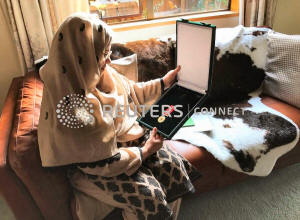Criticism mounts of New Zealand mosque shooting response
 Send a link to a friend
Send a link to a friend
 [August 14, 2019]
By Charlotte Greenfield [August 14, 2019]
By Charlotte Greenfield
CHRISTCHURCH, New Zealand (Reuters) - After
a lone gunman killed 51 mosque worshippers in March, New Zealand's
outpouring of collective grief and Prime Minister Jacinda Ardern's
heartfelt support for the Muslim community won praise around the world.
But months after the attacks in two Christchurch mosques, criticism is
mounting over the aftermath, including the prolonged legal process and
the handling of a powerful government inquiry.
New Zealand is no stranger to natural disasters, but the unprecedented
scale of violence targeting a minority has strained institutions
designed to provide answers and deliver justice.
New Zealand is also less experienced in dealing with cultural needs of
Muslims, who make up only about 1% of the population.
That has led to cultural blind spots, including scheduling hearings
during important religious periods and failing to engage with Muslims in
an appropriate way, members of the Muslim community, experts and
advocates say.
"What's being done to manage the expectations of victims and how do they
actually feel included and ensure they are not re-traumatized through it
and re-victimized through that process?," said Pakeeza Rasheed, a lawyer
and chairperson of New Zealand Muslim women's organization, the Khadija
Leadership Network.

From the beginning, delays and confusion confirming the identities of
victims and releasing bodies upset relatives who were unable to bury
their loved ones as soon as possible, as is customary in Islam.
Soon after the attack, many Muslims questioned whether security services
took the risk of white supremacist violence seriously enough, and
whether authorities were overly focused on the danger of Islamic
extremism.
Ardern in May announced a wide-ranging inquiry, known as a Royal
Commission, seeking answers to such questions.
INCLUSION, SUPPRESSION
But at least six human rights advocates and local Muslims contacted by
Reuters have become skeptical of the process.
New Zealand's Chief Human Rights Commissioner Paul Hunt called on the
Royal Commission to improve inclusion of the Muslim community and said
the Commission's public suppression of information from various
government agencies was too broad.
Former race relations commissioner Joris De Bres declined to give
evidence to the commission last month, saying he too had concerns over
undue secrecy and Muslims being sidelined.
"I…must regretfully decline to participate in the process until I am
confident that it is transparent, places the families of the victims of
the March 15 massacre, and their communities and organizations at its
center and that they have the ability…to question and challenge the
information provided by government agencies under investigation," De
Bres told the Commission in a letter he provided to Reuters.

The Commission said it needed to ask government agencies direct and
probing questions and was working on the assumption that information
gathered would be made public later, wherever possible.
Guled Mire, a Wellington-based Muslim community advocate, initially
accepted an invitation to join a Muslim community reference group set up
by the Commission, but pulled out in July after its first meeting,
saying Muslims were not being listened to.
"They're perpetuating the same attitudes and behaviors that have led to
March 15, essentially ignoring our lived experiences, not valuing what
we have to say, really not willing to engage with us on our terms," Mire
said. "The commission has instead undertaken what I would describe as
tokenistic forms of engagement.”
Pakeeza Rasheed was also invited to join group but said she did not feel
comfortable participating after the Commission did not respond to a
number of questions she had about what the process would entail.
The Commission said the Muslim community reference group was only one
way it was engaging with Muslim communities.
[to top of second column]
|

Ambreen Naeem holds a medal which was posthumously awarded to her
husband Mian Naeem Rashid for bravery, after being killed charging
the attacker at an attack on Al Noor mosque in March in
Christchurch, New Zealand June 13, 2019. Picture taken June 13,
2019. REUTERS/Charlotte Greenfield

"We also continue to meet personally with groups and individuals and
we’re in contact with many more by phone, email and whatever medium
people prefer," a spokeswoman said in an emailed response to
Reuters.
"We understand there may be some members of the Muslim Community
Reference Group who may decide the process is not for them and
that’s ok."
Others say they have been pleased with their interactions with the
Commission.
Ambreen Naeem, whose husband Naeem and eldest son Talhawere killed
at the Al Noor Mosque, contacted the commission by email and was
visited by the head commissioner in July.
Ambreen said she had welcomed the chance to raise questions,
including about how seriously threats of violence against Muslims
were taken in the lead up to the attacks.
"Everyone makes mistakes, if they made mistakes we will understand,
but we need to know," said Ambreen, who is trying to rebuild a life
for herself and two surviving sons.
LONG COURT PROCESS
For Ambreen and others, the long and unfamiliar court process has
been a source of stress and trauma.
In June, relatives and victims were told the trial of suspected
white supremacist Brenton Tarrant, who has pleaded not guilty to 92
murder, attempted murder and terrorism charges, would not take place
until May next year, coinciding with the holy Islamic month of
Ramadan.
"I don’t know why they drag it that long," said Abdul Aziz, who
fought the attacker with a credit card machine at Linwood Mosque.
"Each time I come out of the court, what happens? All the memories
come back."

Muslim Association of Canterbury President Shagaf Khan said they had
asked authorities to change the trial date so it does not coincide
with Ramadan.
A court official said the court was trying to have the case brought
to trial as soon as possible but was open to reviewing the date.
A lawyer for Tarrant, Jonathan Hudson, said: "Our primary concern is
ensuring that Mr Tarrant receives the fair trial that he is entitled
to.”
A third preliminary High Court hearing is scheduled for Thursday.
Two earlier High Court hearings have been set on Fridays, the
holiest day in the Islamic week, and the day the attacks happened.
The Ministry of Justice said it had received initial feedback
gathered from victims at an earlier court hearing by a cultural
adviser it had engaged and was “open to discussion about how we can
do things better to support the victims and their families through
the court process".
The Ministry said it had also arranged to have private rooms and a
prayer room available to victims at the court.
While the court process would inevitably be painful for those
involved, steps could be taken to mitigate trauma such as avoiding
religiously important times for proceedings, acknowledging victims,
and providing culturally informed psychological support processes
for those attending, said Tayyab Rashid, a Pakistani-Canadian
psychologist who ran support sessions at Al Noor Mosque.
"I think the court or legal system can find ways to support them
because this is not the typical case, it is an atypical scenario and
for atypical scenarios, you need atypical solutions."
(Reporting by Charlotte Greenfield. Editing by Lincoln Feast.)
[© 2019 Thomson Reuters. All rights
reserved.]
Copyright 2019 Reuters. All rights reserved. This material may not be published,
broadcast, rewritten or redistributed.
Thompson Reuters is solely responsible for this content.
 |